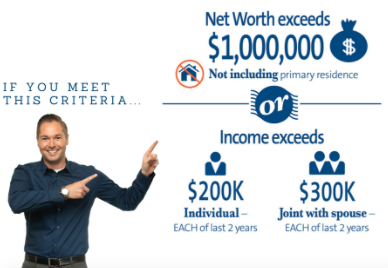All Categories
Featured
Table of Contents
As recognized investors, people or entities might participate in private investments that are not signed up with the SEC. These investors are presumed to have the financial elegance and experience required to review and buy high-risk investment possibilities hard to reach to non-accredited retail investors. Below are a few to think about. In April 2023, Congressman Mike Flood presented H (investments for accredited investors).R
In the meantime, investors need to follow the term's existing meaning. There is no formal procedure or government qualification to become an accredited investor, an individual might self-certify as an accredited investor under existing policies if they earned even more than $200,000 (or $300,000 with a partner) in each of the past two years and anticipate the very same for the current year.
People with an active Collection 7, 65, or 82 permit are additionally taken into consideration to be approved investors. Entities such as corporations, partnerships, and depends on can also achieve accredited capitalist standing if their financial investments are valued at over $5 million.
Right here are a few to take into consideration. Private Equity (PE) funds have shown remarkable growth over the last few years, relatively undeterred by macroeconomic challenges. In the 3rd quarter of 2023, PE bargain volume exceeded $100 billion, about on the same level with offer activity in Q3 of the previous. PE firms swimming pool funding from recognized and institutional capitalists to obtain managing rate of interests in fully grown personal companies.
In addition to resources, angel investors bring their expert networks, guidance, and expertise to the startups they back, with the expectation of endeavor capital-like returns if the organization takes off. According to the Center for Venture Research, the ordinary angel financial investment amount in 2022 was roughly $350,000, with investors obtaining an ordinary equity risk of over 9%.
Best Accredited Investor Income Opportunities
That stated, the arrival of online private credit scores platforms and particular niche sponsors has actually made the asset course easily accessible to specific accredited capitalists. Today, financiers with as low as $500 to invest can capitalize on asset-based exclusive credit score chances, which offer IRRs of approximately 12%. In spite of the surge of ecommerce, physical supermarket still account for over 80% of grocery sales in the United States, making themand specifically the realty they run out oflucrative financial investments for recognized capitalists.
In comparison, unanchored strip facilities and area centers, the following two most greatly negotiated types of property, recorded $2.6 billion and $1.7 billion in deals, specifically, over the exact same duration. What are grocery store-anchored? Country shopping center, outlet shopping malls, and various other retail facilities that feature a major grocery shop as the area's primary lessee commonly fall under this group, although malls with enclosed pathways do not.
To a lower level, this phenomenon is additionally real backwards. This uniquely symbiotic relationship between a center's occupants increases demand and keeps rental fees elevated. Approved investors can spend in these areas by partnering with realty personal equity (REPE) funds. Minimum financial investments normally start at $50,000, while complete (levered) returns range from 12% to 18%.
Professional Real Estate Accredited Investors Near Me (Baltimore)

The market for art is likewise increasing. By the end of the years, this figure is anticipated to come close to $100 billion.
Capitalists can currently possess varied private art funds or purchase art on a fractional basis. accredited investor real estate deals. These options come with investment minimums of $10,000 and use internet annualized returns of over 12%.

Over the previous numerous years, the accredited capitalist interpretation has actually been slammed on the basis that its sole concentrate on an asset/income examination has actually unjustly excluded almost the wealthiest people from lucrative financial investment possibilities. In response, the SEC started considering ways to increase this definition. After a considerable comment period, the SEC adopted these modifications as a way both to catch people that have trustworthy, different signs of economic class and to modernize particular obsolete sections of the meaning.
The SEC's main issue in its regulation of non listed safeties offerings is the protection of those investors that lack an enough degree of financial sophistication. This worry does not relate to well-informed employees because, by the nature of their setting, they have enough experience and access to monetary information to make informed investment decisions.
Innovative Tax-advantaged Investments For Accredited Investors (Baltimore Maryland)
The establishing variable is whether a non-executive staff member actually takes part in the exclusive investment firm's investments, which should be identified on a case-by-case basis. The addition of well-informed employees to the recognized financier definition will also enable even more workers to spend in their employer without the exclusive financial investment business risking its very own status as a certified financier.
Prior to the changes, some private investment firm risked shedding their certified investor status if they permitted their staff members to buy the company's offerings. Under the changed definition, a majority of exclusive investment firm staff members will certainly currently be qualified to invest. This not only develops an added source of resources for the exclusive investment firm, but additionally more straightens the passions of the staff member with their company.
Best Investments For Accredited Investors
Presently, just people holding specific broker or financial advisor licenses ("Series 7, Collection 65, and Series 82") certify under the interpretation, yet the changes give the SEC the capacity to include additional certifications, classifications, or credentials in the future. Particular types of entities have also been included to the interpretation.
The enhancement of LLCs is likely one of the most significant enhancement. When the interpretation was last upgraded in 1989, LLCs were fairly rare and were not included as an eligible entity. Since that time, LLCs have come to be extremely widespread, and the interpretation has actually been improved to reflect this. Under the changes, an LLC is thought about a recognized financier when (i) it contends least $5,000,000 in properties and (ii) it has actually not been developed exclusively for the details purpose of getting the safety and securities provided.

Likewise, certain family workplaces and their clients have actually been included in the meaning. A "family members office" is an entity that is developed by a household to manage its possessions and attend to its future. To ensure that these entities are covered by the interpretation, the modifications mention that a household workplace will currently certify as a recognized investor when it (i) takes care of at least $5,000,000 in properties, (ii) has not been formed specifically for the function of obtaining the supplied safeties, and (iii) is routed by a person that has the monetary class to examine the benefits and threats of the offering.
The SEC requested remarks relating to whether the monetary limits for the revenue and possession examinations in the definition need to be adjusted. These thresholds have actually been in area because 1982 and have not been gotten used to account for rising cost of living or various other aspects that have actually changed in the intervening 38 years. However, the SEC eventually decided to leave the possession and revenue thresholds unmodified for now.
Latest Posts
Best Tax Lien Investing Course
State Tax Lien Sales
Struck Off Property